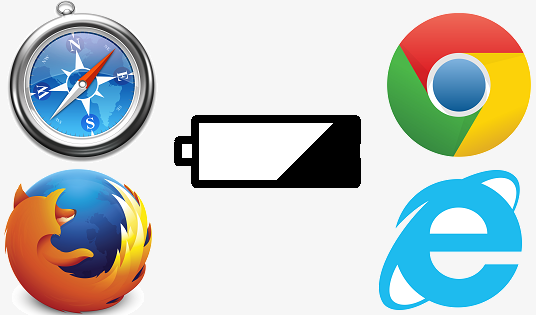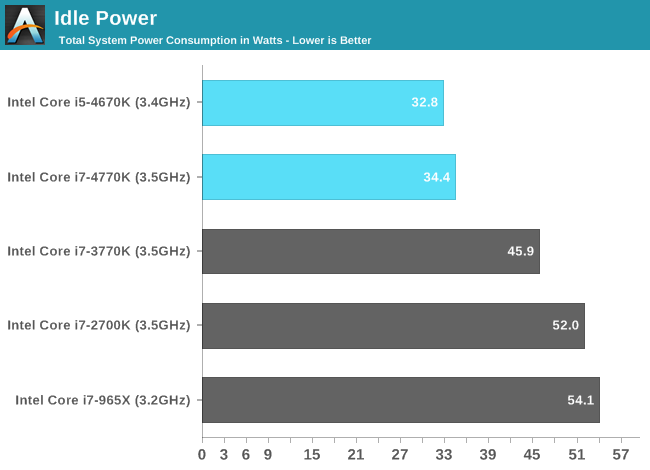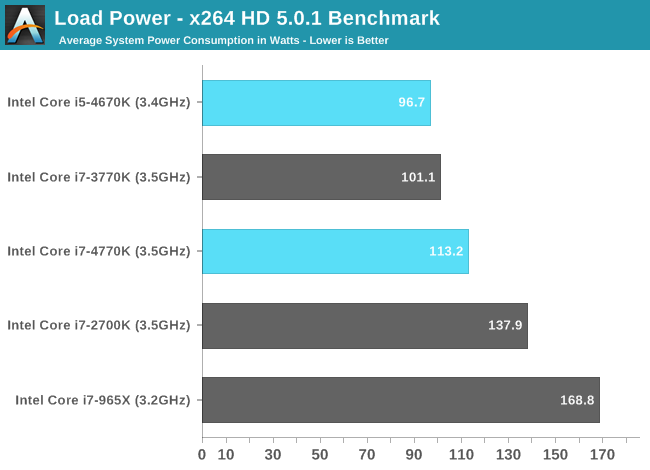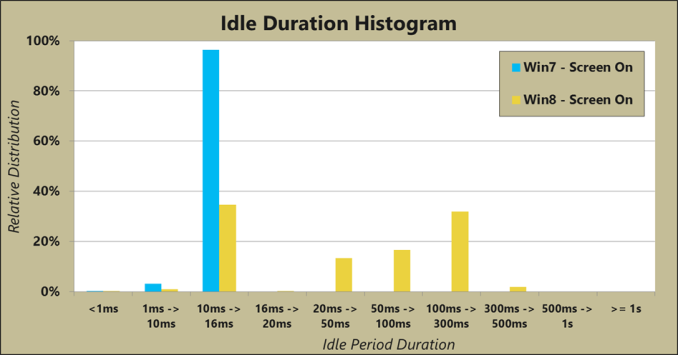Browser Face-Off: Battery Life Explored 2014
by Stephen Barrett on August 12, 2014 6:00 AM EST
It has been five years since we did a benchmark of web browsers effect on battery life and a lot has changed. Back then, our testing included Opera 9 & 10, Chrome 2, Firefox 3.5.2, Safari 4, and IE8. Just looking at those version numbers is nostalgic. Not only have the browsers gone through many revisions since then, but computer hardware and the Windows operating system are very different as well.
Windows Timers: Computer Architecture & Google Chrome
Before we get to any testing of battery life, we need to provide some background information on some of the changes, which requires a deeper understanding of how operating systems and hardware interface with each other. If you've browsed tech news recently, there has been coverage of a Google Chrome design decision from 2010. To recap, Google Chrome on Windows requests the operating system use a 1ms timer in an effort to increase web page rendering speed. Faster is better, but there is a problem with this technique.
For those unfamiliar with OS timers, they form a core component of any operating system. There are two fundamentally different ways to handle timing in a computer system, polling and interrupt modes. A polling system consists of software and hardware that continuously checks to see if something of interest has happened. For example, if a driver sets up a hardware device (i.e. a sound card) to acquire input and then continuously reads memory to check for new values, this is a polling system. However, if the driver sets up the device to acquire and then waits for interrupts (hardware notifications) that new data is available in memory, this is an interrupt system.
In general, interrupt mode is preferred as it saves significant resources and allows other threads to work while the corresponding thread sleeps. The vast majority of API calls a software developer has available do not even provide timing mode selection and simply use interrupt mode. Otherwise, a single application using polling could easily eat up an entire CPU core. There are other factors as well, like preemption, but they are out of scope of this article.
There's a problem with interrupt mode, however: it is slower for a variety of reasons. First, there is interrupt latency. Compared to polling mode checking for something to happen over and over, interrupts are always going to lose.
As an example, if I watch someone building a piece of furniture the entire time, I know exactly when they finish and I can use the furniture. On the other hand, if I wait for the builder to tell me, I could do other things in the meantime (work, sleep, play games, etc.). Of course I wouldn't know exactly when the furniture is ready and there would be a delay between when the furniture is complete and when I first begin using it.
General purpose operating systems like Windows are not typically concerned with interrupt latency. This is more important in embedded mechanical controls like those in your car. But there's another reason interrupts are slower than polling: timer coalescing.
To save power, Microsoft uses timer coalescing in Windows. Applications and drivers waiting for an event can specify their timeout in milliseconds, but in most cases the request time will be rounded to a multiple of Window's 15.6ms default timebase (prior to Windows 8, more on that later). For example, if I wrote some code that waits for an event for 200 milliseconds, Windows might actually sleep my thread for 202.8ms. When two threads request timers, this technique helps Windows continue to wake up at roughly 64 times per second instead of twice as much, 128 times per second.
The results of timer coalescing is that a web browser or other application could theoretically wait up to 15.6ms even when it requests to be scheduled in 1ms interrupts. When push comes to shove, some applications bypass the regular timer mechanism and ask Windows to use a 1ms timer, circumventing these delays. This handicaps CPU and OS power saving features because the longest the hardware and operating system can ever sleep is 1ms. Factoring in thread work time and wake time, sleep duration is likely much less than 1ms.
The power penalty of applications requesting a 1ms timer is exacerbated in Windows 8. In Windows 8, Microsoft maintains the same timer coalescing and timer request API calls, but they have implemented a tick-less kernel under the hood. With a tick-less kernel, the operating system doesn’t just try to round sleep times to a 'default timer resolution' of 15.6ms like Windows 7 and prior did, but instead at every wake event, Windows 8 analyzes the upcoming timed events and intelligently schedules its next wake up time. Therefore, sleep times could be either shorter or much longer than the previous default of 15.6ms. Depending on the distribution of wake up times, this could save significant power. Microsoft provided a blog post with some detail and data regarding the move.
Microsoft did not provide detail on what applications were running when they performed this test. However, we can tell from the data that Chrome was not running, otherwise the only values in the distribution would be at 1ms and below. And that's the crux of the problem.
When Intel launched Haswell one of the focus points was idle power consumption. The theory is when you’re staring at a static screen reading an article or the device is ‘locked’, you can save significant battery life. Consider the following charts of power use for a desktop system:

The idle power of even a desktop Haswell is significantly better than Ivy Bridge

But the load power is the same or worse
Intel spent many years designing Haswell as an improvement over Ivy Bridge for power consumption, but they are at the mercy of application developers. If an application wakes the device up for work every 1ms, the idle power benefits of Haswell don’t have nearly the impact they could.
The developers of Chrome are not ignorant to this and optimized Chrome to turn off its 1ms timer request if the system is running on battery power. However, this optimization is not functional and Chrome unfortunately always requests a 1ms timer. Other developers have criticized this timer technique in Chrome, pointing out that other browsers and high performance applications do not follow this same design pattern and that relying on precise interrupts from a general purpose OS is fundamentally a flawed design. They have likened it to old video games that changed speed with the MHz of the CPU.
By way of comparison, IE and Firefox use a frame rate limiting technique, where they use the default timer resolution of 15.6ms but if a website requests a 1ms refresh rate, they check the system clock after waking up and compute how many iterations to perform to achieve a virtual 1ms update rate. For example, if the browser wakes up after 13ms, then perform 13 iterations before sleeping again. The result is that they do more work less often.











112 Comments
View All Comments
marc1000 - Tuesday, August 12, 2014 - link
as sad as it makes me feel, I have to admit that Opera market share is really small - and shrinking.it's a shame such a creative company get eaten by big marketing companies: Opera was the first to launch a number of innovations that later got integrated into other browsers or even OSs. but right now I don't even know if they will survive another couple years... sad...
PS: multiple tabs in one window, mouse gestures, live preview, speed dial, extremely customizable navigation (ie, turning off scripts, overriding font sizes, desktop client on mobile devices). some of these feats are unmatched even today. mouse gestures were available on Opera for almost a decade before Windows 7 would implement something similar. well, thats life.
Johnmcl7 - Tuesday, August 12, 2014 - link
I agree entirely about Opera, I've used it for many years and I don't think it gets the recognition it deserves for innovating many of the current browser features. I'm concerned their change to the Chromium base is the beginning of the end though, the developers are claiming it's increased Opera usage but I find that hard to believe as the current Opera release doesn't seem to offer much away from Chrome and they've decimated the old Opera with few of its user favourite features implemented in the new version.I plan on using Opera v12 until it's too unreliable/incompatible/insecure and then unless they've made big improvements to the new Opera, switch to something else. On W8 touch systems I have to admit I'm keen on the Modern IE as it's very quick and responsive which is amusing as the reason I originally started using Opera was because Internet Explorer 6 was painfully slow on an XP PC with 128MB RAM.
MamiyaOtaru - Wednesday, August 13, 2014 - link
same. sticking with 12 as long as possible, no desire at all to use the new one. They killed themselves for me trying to chase after average users, and I'm not sure they actually attracted any. At the very least they can be sure more websites work with their browser even if no one tests against Opera (thanks to using Chromium), but I really wish they'd considered switching engines but keeping their UILerianis - Thursday, August 14, 2014 - link
They already have made many improvements to the new version of Opera. In fact, all it is missing compared to Opera v12 is support for saving pages in .mht format, something that I still rely on Opera v12 for.The new Opera can OPEN .mht files, it just cannot SAVE in that format. Which seems kinda weird but eh...
Blisse - Saturday, August 16, 2014 - link
I switched from Opera to Chrome 2 years ago. Opera started crashing inexplicably and I found a replacement for gestures on Chrome. I loved how forward thinking it was with its features and skipped Firefox because they blatantly copied Opera's menu button design, but I can't say I'm missing Opera now. The stability of modern browsers is just so much better than Opera was and I was sick of Opera specific problems. I loved the bookmarks tab though. I'm almost at the point where I'm going to try IE again versus Chrome and this article helped me stick around on Chrome a bit longer.furnace51 - Thursday, August 14, 2014 - link
Given opera has the ability to 'mask' it's self and pretend to be IE and other browsers, I wonder how many false counts exist.. my guess is Opera is better represented than statistics suggest.I have my Opera set to mask as it prevents idiot websites presenting me with inane popups saying my browser is out of date, just because Opera did not present it's self as the latest version of IE, Chrome or Firefox.
Morpheusx3 - Tuesday, August 12, 2014 - link
For the record, this was addressed in the article. Safari was excluded because of numerous issues.Regardless, an OSX battery life test would undoubtedly be interesting to read. I'd be down for that too.
Wixman666 - Tuesday, August 12, 2014 - link
They can't test safari on OSX since the rest are tested under Windows. They'd be comparing apples and oranges. As far as Opera is concerned, does anyone actually USE opera anymore??BC2009 - Tuesday, August 12, 2014 - link
They could test all the browsers on OS X with the exception of Internet Explorer.Both Safari and Internet Explorer are OS-specific. The only cross-platform browsers are Firefox, Chrome and Opera.
lightsout565 - Tuesday, August 12, 2014 - link
I'd also love to read an OSX battery life test. I'd be interested to see how optimized Safari is for power usage compared with Firefox/Chrome/Opera.